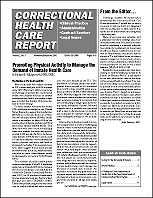The Red Zone: Boundaries of Clinical Versus Forensic Work in Correctional Settings
Author: Kathryn A. Burns, M.D., M.P.H..
Source: Volume 07, Number 05, July/August 2006 , pp.67-72(6)

< previous article |next article > |return to table of contents
Abstract:
Providing psychiatric care in a correctional institution can raise complex ethical questions: The psychiatrist is charged with the dual responsibility of serving the needs of patients while simultaneously serving the needs of the institution. The ethical principles governing the provision of care and treatment are those that apply in the doctor-patient relationship and are known as traditional medical ethics. However, many situations arise in the correctional setting in which the psychiatrist is called upon to conduct an evaluation in which the aim or purpose is not treatment per se, but rather to further the needs of the institution. Examples include instances in which a psychiatrist is asked to evaluate an inmate’s competence to participate in a disciplinary hearing or to conduct an evaluation for the parole board. In these situations, the psychiatristis better guided by the ethical principles of forensic psychiatry rather than those of traditional medical ethics.Keywords: dual agent, Beneficence, malfeasance, confidentiality, collateral information, Inmate Disciplinary Process, Administrative segregation
Affiliations:
1: Case Western Reserve University.